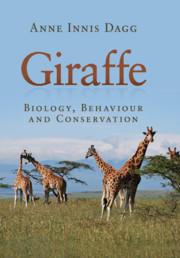Book contents
- Frontmatter
- Dedication
- Contents
- Preface
- Acknowledgements
- List of abbreviations
- 1 Time-line of giraffe
- 2 The giraffe’s environment
- 3 Feeding in the wild
- 4 Social behaviour and populations
- 5 Individual behaviours
- 6 External features
- 7 Anatomy
- 8 Physiology
- 9 Pregnancy, growth, reproduction and aging
- 10 Giraffe in zoos
- 11 Status and conservation of giraffe races
- Appendix Parasites and pathogens
- References
- Index
3 - Feeding in the wild
Published online by Cambridge University Press: 05 February 2014
- Frontmatter
- Dedication
- Contents
- Preface
- Acknowledgements
- List of abbreviations
- 1 Time-line of giraffe
- 2 The giraffe’s environment
- 3 Feeding in the wild
- 4 Social behaviour and populations
- 5 Individual behaviours
- 6 External features
- 7 Anatomy
- 8 Physiology
- 9 Pregnancy, growth, reproduction and aging
- 10 Giraffe in zoos
- 11 Status and conservation of giraffe races
- Appendix Parasites and pathogens
- References
- Index
Summary
Foraging
Feeding is necessarily the prime activity of giraffe in the wild because they have a large body to maintain. They may eat at every hour of the day, especially in winter or dry seasons when less food is available, and in the night as well (Innis, 1958; Foster, 1966). Often they forage on leaves, flowers, fruits or twigs in the morning and late afternoon, spending the midday ruminating and resting. Although they are particularly fond of Acacia trees or bushes, they forage on many other species too, depending on the season. They do not select, as lesser kudu and gerenuk do, chiefly young and tender shoots (Leuthold, 1971; Leuthold and Leuthold, 1972). Barbara and Walter Leuthold (1978b), who over 16 days timed the activities of giraffe in Tsavo East National Park, Kenya, report that on average the eight males foraged for 27% of each day and the four females (most of them lactating) for 53%.
Giraffe have feeding down to a science. To consume a secondary branch with small leaves, say one of Securinega virosa, a giraffe curls its tongue around the base of the branch and, with a swift jerk of its head upwards and sideways, strips off all the leaves into its mouth, leaving the branch bare (Berry, 1973). If a branch has thorns, it nimbly works around them with its tongue to obtain the leaves, perhaps cutting a twig off with its broad lower canine. They eat bark too – along the Chobe River in Botswana they were stripping the bark from Natal mahogany trees (Tutchings, 2012).
- Type
- Chapter
- Information
- GiraffeBiology, Behaviour and Conservation, pp. 24 - 38Publisher: Cambridge University PressPrint publication year: 2014



